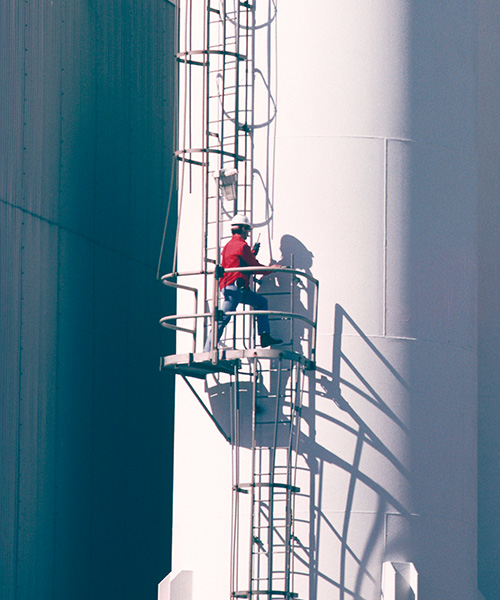June 21, 2022 • 5 min read
Energy transition: Reskilling our workforce
Why building a high quality workforce is key to delivering sustainable transformation
We need to reinvent the way we deliver energy infrastructure to meet the decarbonization challenge. This means embracing new technologies, rethinking project delivery, and broadening how we think about value.
But it also requires making the energy sector a more attractive place to work. And to help people transition from old industries to emerging industries, so they can design and operate the lower carbon solutions required to meet sustainability goals.
“I’ve been involved in the energy industry for a couple of decades now,” says Sue Brown, Executive Group Director, Sustainability & Corporate Affairs.
While the engineering challenge ahead is like nothing we’ve seen before, the human challenge will ultimately define our success.
Sustainable solutions start with people
In 2022 Brown was asked to contribute to KMPG's ‘30 Voices on 2030’ ESG Interviews, exploring the opportunities and challenges in Australia’s energy landscape over the coming decade.
“The key challenge is how we support thousands of people as they transition their focus to developing lower carbon infrastructure. And then building it faster than at any other time in history.
“In our case, that means guiding thousands of our people in a new direction, where projects look very different to even a decade ago. Some of our engineers are now working on technologies that didn’t exist when they were studying at university, and thousands more will soon follow.”
This skills shift reflects our focus on making sustainable transformation a reality.
“We’re aspiring to earn 75 percent of our revenue from sustainability projects by 2026, in step with our corporate commitment to achieve net zero scope 1 and 2 emissions by 2030 and eliminate scope 3 emissions by 2050. And we’re incentivizing our people accordingly,” says Brown. “But we’re not going to leave our traditional customers behind to achieve these targets. Even small changes in hard to abate industries can have large impacts on global CO2 emissions.”
The growing focus on sustainability and decarbonization represents a significant moment in our industry. Brown reflects on why.
“It’s a different focus to when I started my career, which was more about growing economies and living standards by extracting more natural resources,” she notes. “But as the risks to our natural environment grow, the way we define value has to change.”
Training our people to work in new sectors
Brown believes access to talent does not guarantee that a company will succeed in the energy transition.
“No business can deliver the scale of lower carbon infrastructure required without prioritizing learning and development,” she says.
“The key to retaining great people – and attracting new talent – is to offer people the opportunity to transition into the emerging sectors they’re interested in.
“That’s why we’re focused on making this transition as easy and accessible as possible. We’re rolling out a range of learning modules and on the job reskilling to support our people who’ve worked in traditional carbon intensive areas as they make the jump into emerging fields, such as offshore wind, renewable carbon hydrogen, carbon capture, use and storage and environmental consulting.”
Every person at Worley is encouraged to gain learning accreditations through a program of ‘passport’ courses focused on sustainability related topics. These courses introduce the themes and technologies that will have the greatest decarbonization impacts on the energy, chemicals and resources industries. And it enables passport holders to expand their conversations with customers and consider the future energy landscape at every stage of a project.
“Within a year of launch, we’ve issued more than 27,000 learning accreditations including over 6,700 completions of the Energy Transition Passport,” highlights Brown. “We've also rolled out additional modules on topics such as carbon capture, use and storage, water, copper and more. This is just the start of our vision to have as many people as possible driving the decarbonization cause and building skillsets they can use across different industries.”
Forming partnerships to fill skills gaps
While Brown is focused on the importance of in-house learning, she is realistic that no business can overcome the scale and complexity of the decarbonization challenge alone.
“We’ve supported our customers with many engineering challenges over the last 120 years,” she says. “And yet, we only have a fraction of the reach and capability needed to overcome all the decarbonization hurdles their industries will face for the rest of this century.”
But as Brown explains, embracing a shift toward partnerships and collaboration in energy, chemicals and resources projects can accelerate progress toward the world’s sustainability goals.
“We are already forming partnerships with other organizations and businesses that are committed to scaling up lower carbon solutions. One example is our partnership with ABB and IBM, which focuses our expertise on growing the production and adoption of renewable hydrogen as a lower carbon energy carrier.
“We’ve also partnered with Princeton University to examine how infrastructure projects need to change to achieve net zero emissions by mid-century,” continues Brown. “This thought leadership is guiding our approach to delivering lower carbon projects more quickly and efficiently.”
Collaboration between competitors is another emerging theme across the energy, chemicals and resources sectors, too.
“We recently participated in the ‘Charge on Innovation Challenge’, driven by traditional competitors, BHP, Rio Tinto and Vale,” adds Brown. “This is a glimpse of where our industries are going, as competitors come together to find solutions to their decarbonization challenges. It’s a similar approach to how COVID-19 vaccines were developed in record time. Collaboration can help us deliver comparable outcomes in CO2 intensive industries.”
Opportunities to learn new things and work on different projects
Brown is optimistic about the task of transforming the world’s heavy emitting industries in less than three decades.
“The word I want to emphasize is opportunity. Not just within Worley, but across all sectors that need to change their processes. There is so much work to do, and we’ll have both successes and failures along the way. But each engineering problem represents an opportunity for people to contribute to better sustainability outcomes.
“Our shared success depends on embracing a future where our people have unlimited opportunities to learn new things and bring their insights to different projects throughout their careers. One where competitors work together to deliver better outcomes for communities and the world. And one that delivers critical infrastructure faster than anyone thought possible.”




